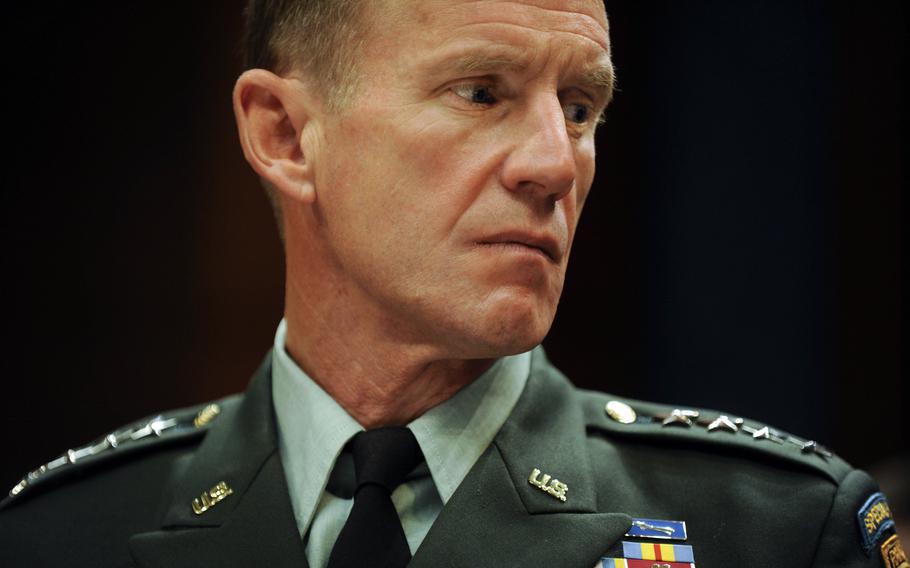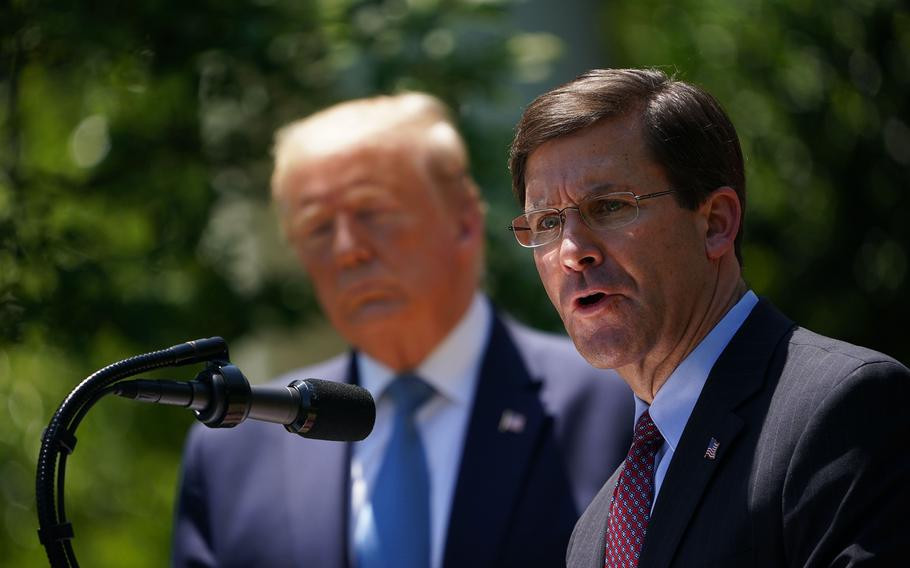
Retired Gen. Stanley A. McChrystal, an Army Ranger whom President Barack Obama famously ousted as the commander of U.S. forces in Afghanistan, called Trump “immoral” in an interview with ABC News. (Melina Mara/Washington Post )
WASHINGTON — President Donald Trump wanted to court-martial two prominent retired military officers for their perceived slights and disloyalty, his former defense secretary Mark Esper alleges in a new book, the latest insider account to raise claims about the combative commander in chief and his attempts to upend government institutions.
Trump, Esper recounts in “A Sacred Oath,” had developed a disdain for Stanley McChrystal and William McRaven, popular and influential leaders who, in retirement, criticized the president. When Trump informed Esper and Gen. Mark Milley, chairman of the Joint Chiefs of Staff, of his wish to see McChrystal and McRaven court-martialed, the two Pentagon leaders “jumped to their defense,” Esper writes, arguing that both completed distinguished military careers and that taking such action would be “extreme and unwarranted.”
“Doing this ‘will backfire on you, Mr. President,’ we said,” Esper writes. “The discussion went back and forth a little while longer in the Oval Office, with Milley finally figuring out a way to get the president to back down by promising that he would personally call the officers and ask them to dial it back.”
The alleged episode highlights Esper’s often uneasy tenure in Trump’s Cabinet, a fraught 15 months when, according to his memoir, he endeavored to serve as a guardrail on Trump’s most alarming and inappropriate impulses.
Elsewhere in the book, Esper describes a campaign to purge officials deemed insufficiently loyal to Trump in favor of others thought to be more pliable.
A White House liaison assigned to the Pentagon “expressed an interest in ‘interviewing’ the DOD’s senior officers, which we saw as a code for loyalty tests,” Esper recalls. “We shut this down immediately.”

U.S. Defense Secretary Mark Esper, with U.S. President Donald Trump, speaks on vaccine development on May 15, 2020, in the Rose Garden of the White House, in Washington, D.C. (Mandel Ngan/AFP/Getty Images/TNS)
In an interview, Esper said Trump’s desire to punish McChrystal and McRaven was “obviously disconcerting” and that he considers the two men to be heroes.
“If I wasn’t there and Milley wasn’t there, what would have happened?” he said. “And what would it have done to the military profession for a president to call back to active duty two ... retired four-stars and to try and court-martial them for publicly expressing their views?”
McChrystal, an Army Ranger whom President Barack Obama famously ousted as the commander of U.S. forces in Afghanistan, called Trump “immoral” in an interview with ABC News. McRaven, who under Obama devised the operation resulting in Osama bin Laden’s death, accused Trump in an opinion piece of having “embarrassed us in the eyes of our children, humiliated us on the world stage and, worst of all, divided us as a nation.”
McChrystal and McRaven could not be reached for comment. Milley’s office declined to comment.
Trump’s office did not respond to a request for comment. The former president previously has criticized Esper in response to questions about the book, calling him a “stiff” and a “lightweight.”
Esper also alleges in his book that Trump asked if U.S. troops could shoot at American civilians protesting against racism in the wake of the police killing of George Floyd, and suggested that the Pentagon launch Patriot missiles at drug laboratories in Mexico — saying no one would know the United States was responsible.
Esper said he began writing the memoir almost immediately after Trump removed him in office in November 2020, within days of his reelection defeat. There had been growing friction between the two for months, Esper writes, but “I felt I was still able to manage the president and his worst instincts.”
When asked why he did not speak out about his concerns while still in office, Esper said that, if he had, he would have been fired with no clarity on who would replace him running the Pentagon.
“I don’t know who is going to come in behind me, and I didn’t have confidence that they would do the things that I was doing — that they would push back,” Esper said. “My concern was that they would actually implement some of these outlandish ideas. . . . If you’re serious about your oath and putting the country first, then the higher calling was to kind of hang in there and try to keep things steady as she goes.”
Esper said little in the aftermath his dismissal, but on Jan. 3, 2021, he joined with nine other living former defense secretaries in saying it was time for Trump to stop questioning his loss to Joe Biden and that there was no role for the military in changing that outcome. It was an extraordinary rebuke of the outgoing president.
Three days later, a mob supporting Trump attacked the U.S. Capitol seeking to overturn the election.

Retired U.S. Navy Adm. William McRaven, commander of the U.S. Special Operations Command, speaks to special operations commanders during a commander’s call at Hurlburt Field, Fla., Jan. 30, 2012. (Christopher Williams/U.S. Air Force)
Esper sued the Pentagon to expedite a security review of his book. He wanted to publish it faster, he said, but had to wait for the Defense Department to screen it for classified information. As defense secretary, he said, he found himself consulting “Duty: Memoirs of a Secretary at War,” in which former defense secretary Robert Gates detailed his challenges while serving under presidents Obama and George W. Bush. Esper said he hopes others might do the same with his work.
Esper expressed regret in his book for appearing with Trump in Lafayette Square outside the White House in June 2020 after federal forces had cleared the area of protesters demonstrating against racial injustice. Esper recounts turning to Milley in that moment and telling him, “I think we’ve been duped.”
“My gut was telling me the whole episode was inappropriate, and that I had made the mistake of being drawn into this highly political moment,” Esper writes. “While the walk and pictures resonated with many in his base, the context, the pretext, the images, and the message — whatever it really was — was awful.”
Esper agrees with Trump on other issues. He writes, for instance, that Trump’s criticism of U.S. allies for spending less on defense was “spot-on,” and that after months of escalation with Tehran, he agreed with Trump’s order to kill Qasem Soleimani, the commander of Iran’s Quds Force. The move prompted Iran to launch ballistic missiles at U.S. troops in western Iraq. None were killed, but some suffered traumatic brain injuries. The two sides then settled into an uneasy detente.
“It was a bold decision by the president and I give him credit for making it,” Esper said.
But Esper takes a dim view of Trump’s effort to overturn the election. Trump, he writes, “did not even bother to attend the Inauguration — the first sitting and able president to skip his successor’s inauguration since 1869.
“It was a final act of petulance that defied tradition, tarnished our democracy, and further damaged Biden’s legitimacy with millions of Americans,” Esper writes. “ ... I sat at home, watching carefully, eagerly, and finally, both pleased and relieved that we made it — the nation made it.”